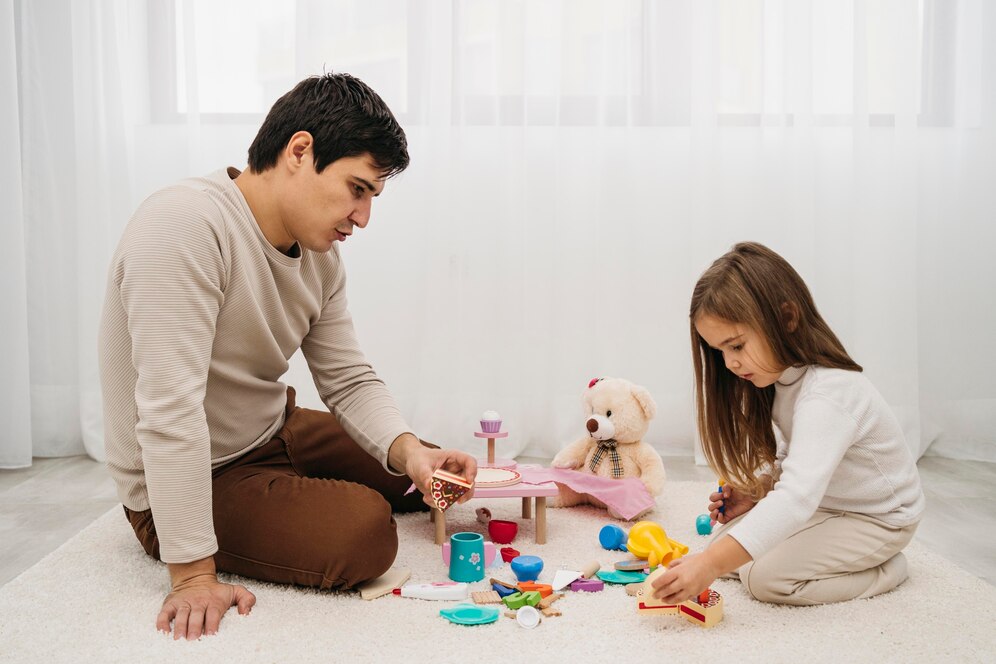The Parenting & Family Blog

Positive Parenting: How to Raise Respectful and Confident Kids
In today’s busy world, parenting is like a careful balance of nurturing and discipline. Parents often wonder how to raise children who are both respectful and confident. Positive parenting is now a top approach. It offers a balanced way that focuses on respect and confidence in children. This method uses positive discipline strategies. It wants to raise well-behaved children by focusing on understanding and empathy instead of fear and punishment.
Positive parenting goes beyond techniques; it’s about creating a loving and supportive space for children to thrive. Using the best parenting methods helps parents create a solid base for their children’s future success and happiness. In this blog, we’ll look at the main benefits of positive parenting. We’ll share useful strategies and expert tips to support you on this rewarding journey.
Key Benefits of Positive Parenting

Why It Matters
Positive parenting is not merely a trend; it is a profound shift in how we perceive and enact discipline. The approach is supported by strong research. It shows that children benefit socially, emotionally, and cognitively. Focusing on positive discipline helps kids learn important life skills. These include problem-solving, empathy, and self-regulation.
Real-Life Applications
Positive parenting focuses on open talks, showing respect, and working together to solve problems. For example, if a child misbehaves, a positive parent might talk to them about their feelings. They can also discuss the results of the child’s actions instead of using punishment. This helps the child see how their behaviour affects others. It also empowers them to choose better in the future.
Data-Backed Insights
Children raised with positive discipline strategies often have higher self-esteem. They usually perform better in school and show fewer behaviour problems. A report from the American Psychological Association says that children with regular, positive interactions with their parents tend to form secure attachments. They also show more resilience when facing challenges.
Step-by-Step Guide to Positive Parenting
Building a Strong Foundation
To use positive parenting well, start by building trust and respect. Here are some steps to guide you:
Establish Clear Expectations
- Begin by setting clear, age-appropriate expectations for behaviour.
- Communicate these expectations to your child in a calm and respectful manner.
- Make sure your child knows why the rules exist and what happens if they don’t follow them.
Foster Open Communication
- Encourage your child to express their thoughts and feelings openly.
- Listen closely and acknowledge their feelings, even if you don’t share their view.
- This builds trust and helps your child feel valued and understood.
Model Respectful Behaviour
- Children learn by observing the adults around them.
- Show respect in how you interact with others, and your child will probably do the same.
- Show empathy, apologise when necessary, and treat others with kindness.
Implementing Positive Discipline Strategies
After setting the foundation, you can start using positive discipline strategies in your parenting.
Use Natural Consequences
- Allow your child to experience the natural consequences of their actions when appropriate.
- This teaches them responsibility and helps them learn from their mistakes.
- If your child forgets their homework, they might get a lower grade. This can help them learn a valuable lesson.
Reinforce Positive Behaviour
- Focus on reinforcing positive behaviour rather than punishing negative actions.
- Praise your child when they share or cooperate with others.
- This encourages them to continue these behaviours in the future.
Problem-Solve Together
- When conflicts arise, involve your child in finding a solution.
- Encourage them to think critically about the situation and brainstorm possible resolutions.
- This empowers them to take ownership of their actions and develop problem-solving skills.
Additional Expert Tips & Common Mistakes to Avoid

Best Practices Beyond the Basics
The key steps and strategies matter, but other practices can boost your positive parenting journey:
Encourage Independence
- Foster your child’s independence by allowing them to make age-appropriate choices.
- This builds their confidence and decision-making skills.
- For example, let them choose their clothes or decide on a family activity for the weekend.
Prioritise Quality Time
- Spend quality time with your child, engaging in activities that strengthen your bond.
- This can be as simple as reading together, playing a game, or taking a walk.
- Quality time reinforces your connection and provides opportunities for positive interactions.
Common Mistakes and Misconceptions
Despite the many benefits of positive parenting, it’s easy to fall into common traps. Here are some pitfalls to avoid:
Being Inconsistent
- Consistency is key to positive parenting.
- Inconsistent rules and consequences can confuse your child and undermine your efforts.
- Make sure both parents agree and follow the rules consistently.
Overlooking Self-Care
- As a parent, it’s important to take care of yourself.
- Neglecting self-care can cause burnout. This makes it hard to stay positive as a parent.
- Take care of yourself first. This way, you’ll have the energy and patience to help your child.
Advanced Insights & Expert Recommendations
Embrace Emotional Intelligence
- Emotional intelligence is a crucial component of positive parenting.
- Show your child how to recognise and manage their feelings. Also, model this behaviour yourself.
- This enhances their ability to navigate social situations and build healthy relationships.
Cultivate a Growth Mindset
- Encourage a growth mindset in your child by praising effort rather than innate ability.
- This builds resilience and a love for learning. It helps them face challenges with confidence and determination.
Unique Industry Perspectives
Experts in child psychology and education offer valuable perspectives on positive parenting.
- Dr. Jane Smith, a renowned child psychologist, emphasises the importance of empathy in parenting:
- “Empathy is the cornerstone of positive parenting. When you understand and validate your child’s feelings, you help create a caring space for them to grow.“
Raising Respectful, Confident, and Happy Kids

Positive parenting offers a transformative approach to raising respectful and confident children. Parents can help their kids do well by using positive discipline and talking openly. Stay consistent, show respect, and encourage independence to enhance your parenting journey.
As you embark on this path, consider the words of Dr. Jane Smith:
- “Parenting is not about perfection; it’s about connection.”
- Welcome the journey with an open heart and a desire to learn. You will surely notice the positive effects on your child’s life.
In conclusion, positive parenting helps raise well-behaved kids. It gives them the skills to face life’s challenges with confidence and respect. Use the best parenting methods and keep improving your skills. This way, you can build a caring space where your child can thrive.
What will you do today to embrace positive parenting and help your child grow?









